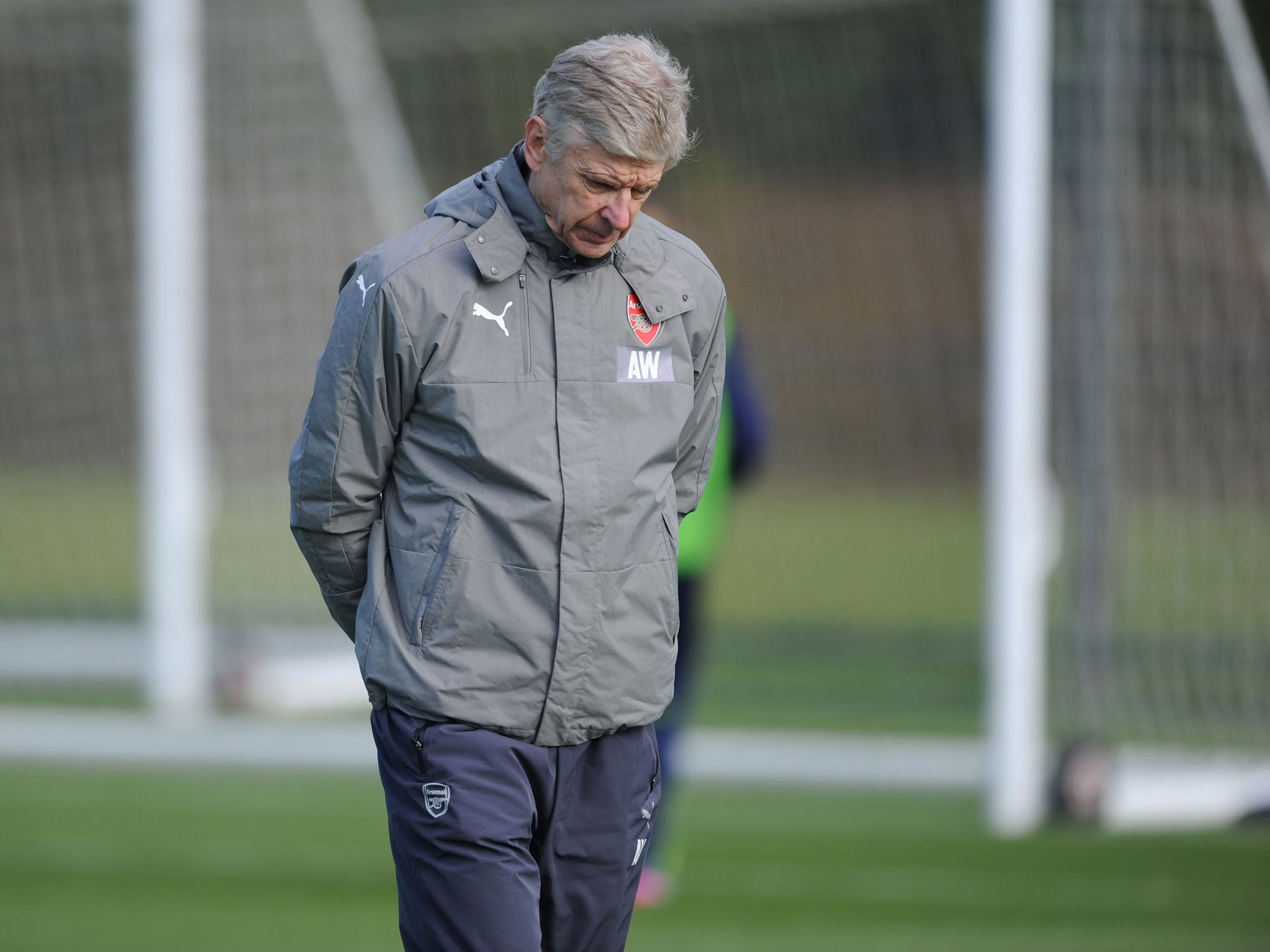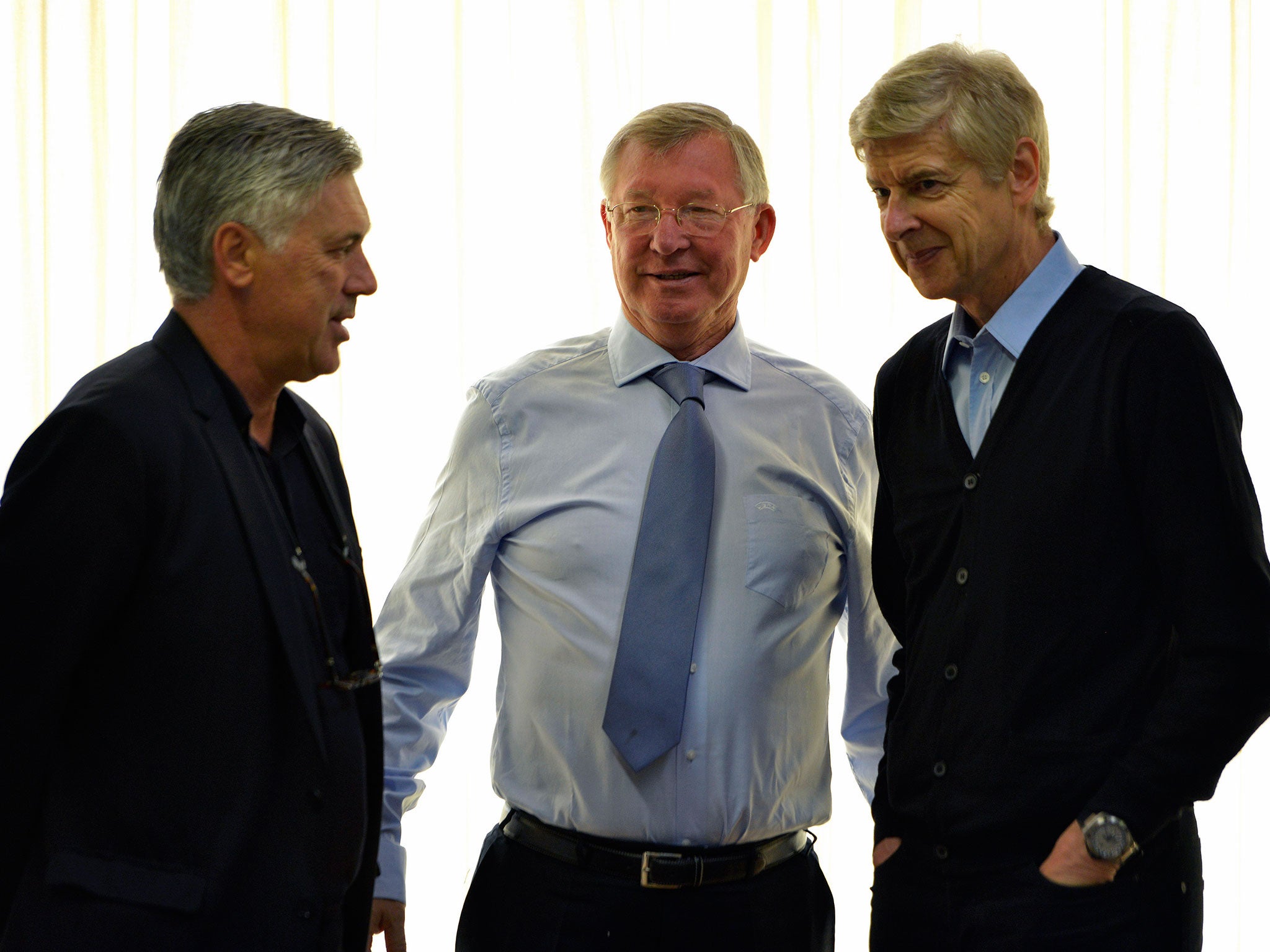Arsene Wenger is not raging against the dying of the light and that is why his side have become serial failures
Delve into the uglier sides of Carlo Ancelotti and Sir Alex Ferguson and you will find a ruthless streak that Wenger lacks, much to his weakness

Your support helps us to tell the story
From reproductive rights to climate change to Big Tech, The Independent is on the ground when the story is developing. Whether it's investigating the financials of Elon Musk's pro-Trump PAC or producing our latest documentary, 'The A Word', which shines a light on the American women fighting for reproductive rights, we know how important it is to parse out the facts from the messaging.
At such a critical moment in US history, we need reporters on the ground. Your donation allows us to keep sending journalists to speak to both sides of the story.
The Independent is trusted by Americans across the entire political spectrum. And unlike many other quality news outlets, we choose not to lock Americans out of our reporting and analysis with paywalls. We believe quality journalism should be available to everyone, paid for by those who can afford it.
Your support makes all the difference.After Arsene Wenger had departed so diffidently, vanishing through a side door having spoken for ten seconds short of three minutes about what he called his “nightmare” in Munich, it was hard not to recall Sir Alex Ferguson’s own valedictory night in Europe.
After his last match in continental competition, against Real Madrid at Old Trafford four years ago, Ferguson was too incandescent with the Turkish referee even to appear and discuss the sending off of Luis Nani which contributed to a 2-1 defeat by Real Madrid. “I don’t think the manager is in any fit state to talk,” said Mike Phelan, whom Ferguson sent up in his place.
Wenger has at least one of these moments of post-match theatre left, at the Emirates next month, though it is his benignity and, as someone described it this week, his “niceness” which mean he will almost certainly never claim the trophy which has always fascinated him most.
His players scuttled out of town in rapid order – refusing, to a man, to stand up, be counted and discuss the 5-1 defeat with the English media which their fans were consuming on Thursday morning. On the worst of United’s nights at least one of Ferguson’s men would front up. Let the statistics speak for themselves, then, because when the dust had settled they revealed the niceness of Arsenal, too.
By half time on Wednesday, Wenger’s players had been the game’s aggressors, committing the game’s most fouls – ten, to Bayern’s four, as they fought back into a contest which had seemed lost. But when the second half arrived and more of that aggression was required, they evaporated. Arsenal committed a solitary foul to the Germans’ eight in the second half on a night when they should have been fighting for their reputations.
Just one Arsenal ball was played into the German penalty area in the second period, to the Germans’ 11. A mere six Arsenal balls reached their attacking third, against Bayern’s 42. Wenger cited the 49th minute departure of Laurent Koscielny as significant, though it was relatively insignificant against the broader backdrop of Arsenal barely entering German territory. Phillipp Lahm, who did stop to talk, provided a revealing insight into the Koscielny dimension. He said he hadn’t actually realised the Frenchman left the field.
The exception to this story of the supine Arsenal is Alexis Sanchez, who registered on Arsenal’s goalscorer, attempts on and off target, fouls committed and suffered, offsides and bookings charts. Mesut Özil, Alex Iwobi, Alex Oxlade Chamberlain, Kieran Gibbs barely registered in those categories at all. None of those players registered more than two interventions in the above categories. Hector Bellerin did not register any at all: for him, a totally blank night.
In his own post-match press conference, Carlo Ancelotti was given the chance to express “sympathy" for Wenger yet he was hardly giving off warmth. “This is football,” the Italian replied, flatly. “Arsene has a lot of experience, he has the experience to manage this moment and this result. It is only one game.”
Ancelotti does not create a lot of visible heat or light. He was a presence in the technical area on Wednesday night but he does not contort himself into shapes like his predecessor Pep Guardiola. The book discussing the Italian's methods, co-written with him by Chris Brady and Mike Forde last year, is entitled ‘Quiet Leadership’ for good reason. Yet the study reveals that plenty of the anger resides within. Zlatan Ibrahimovic tells Brady and Forde about the ‘Ancelotti eyebrow,’ which put in an appearance at half time on a bitterly cold night at Evian, during the player and coach’s time together at Paris Saint Germain.

“The pitch was terrible and we didn’t play well,” Ibrahimovic relates. “At half-time, you always know when something is going on because that one eyebrow goes up. As I sat down I thought, ‘Now he’s angry.’ There was a box in front of him and from nowhere he kicked it and it flew through the air and hit me on the head. ‘Jesus,’ I thought. ‘Now he’s really angry’.”
Rafael Benitez certainly felt that the Real Madrid set-up he inherited when succeeding Ancelotti at the Bernabeu was in need of greater intensity, though David Beckham was another who tells that the Italian can explode at times. "Scary," he called it.
Ferguson’s last bow against Bayern came on the night when he caused a diplomatic incident, infamously castigating the "typical Germans" after Rafael da Silva's dismissal in United's 2010 quarter final exit. Just a modicum of Wenger indignation, directed at his effete players in the press conference theatre, would not have gone amiss on Wednesday though, as always, he protected them. Unlike Ferguson in so very many ways, he is not a man to rage against the dying of the light.
Join our commenting forum
Join thought-provoking conversations, follow other Independent readers and see their replies
Comments